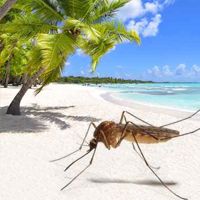Article
Modified Measles Vaccine Effective Against Chikungunya Virus
Author(s):
An adapted version of the conventional measles vaccine could potentially be effective against the Chikungunya virus.

An adapted version of the conventional measles vaccine could potentially be effective against the Chikungunya virus.
Recently published in the journal The Lancet, results from the study, led by Bernd Jilma and colleagues from the Institut Pasteur in Paris and in collaboration with Themis Bioscience GmbH, shed light on the benefits of using the measles vaccine to inject the human body with tiny surface particles of the Chikungunya virus.
Since late 2013, over one million cases of Chikungunya have been reported in the Americas and the Caribbean alone. The potentially fatal mosquito-borne epidemic is associated with substantial public health and economic concerns.
There has not been reported a successful medication or vaccine against the Chikungunya fever-induced muscular and joint pain until now.
Jilma and his team conducted a phase 1, dose-escalation study randomly assigning 42 healthy men and women aged 18—45 years to receive either one of 3 escalating doses of the measles-virus-based candidate vaccine: low dose [1·5 × 104 median tissue culture infection doses (TCID50) per 0·05 mL], medium dose [7·5 × 104 TCID50 per 0·25 mL], or high dose [3·0 × 105 TCID50 per 1·0 mL], or the active comparator—Priorix.
The researchers’ primary focus was the immunogenicity, safety, and tolerability of the vaccine.
Jilma said, "The modified measles virus is planted into people in Trojan horse style, and there it produces the corresponding surface particle of the Chikungunya virus. This occurs to such a low concentration that no symptoms of the disease appear. However, the Chikungunya particles are still able to stimulate the lymphatic system and to trigger the antibody production against the virus. These antibodies are then available at any time should an infection with the Chikungunya virus really occur. As a result, the disease cannot break out."
The candidate vaccine raised concentrations of neutralizing antibodies to Chikungunya in all dose cohorts after one immunization, with seroconversion rates of patients producing anti-Chikungunya antibodies of 44% in the low, 92% in the medium, and 90% in the high-dose group. The immunogenicity of the candidate vaccine was not affected by pre-existing anti-measles immunity.
The candidate vaccine had an overall good safety profile. Despite an increase in the rate of adverse events with vaccine dose and volume, no vaccination-related serious adverse events were recorded.
It is important to note this modification also strengthens immunity against the classic measles infection. As such, these results warrant further clinical evaluation in Phase II and III studies — lasting nearly 3-5 years.
According to Jilma, "If the vaccine is changed accordingly, it could also be effective against dengue fever or other viruses. An active immunization is possible using a one or two-part vaccination.”
Erich Tauber, MD, CEO of Themis concluded, “Recent outbreaks have raised awareness of Chikungunya virus worldwide and whilst further work is needed to show safety, tolerability, and ability of the vaccine to protect against live Chikungunya virus, our trial data suggest that this novel vaccine is an excellent candidate to help address this urgent medical need. With these promising results, we are advancing the Chikungunya vaccine program and aim to move rapidly into phase II studies.”





